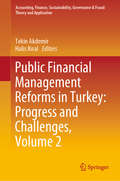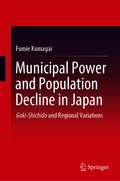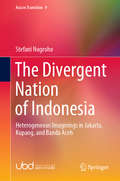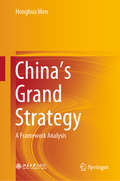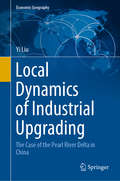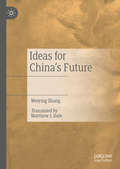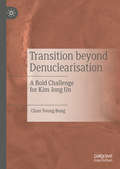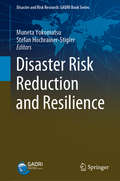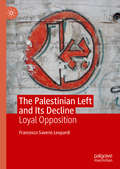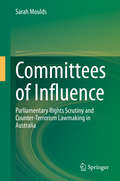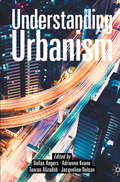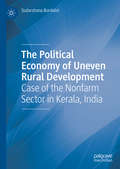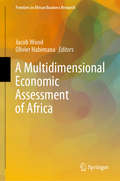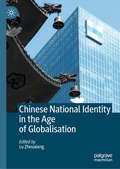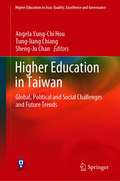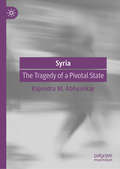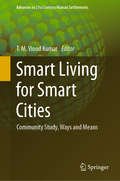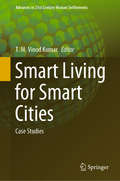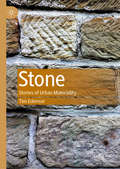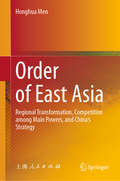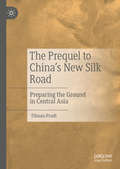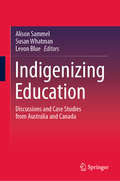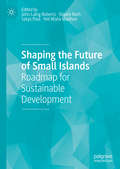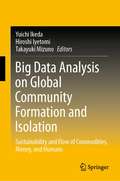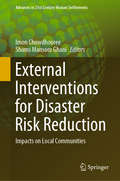- Table View
- List View
Public Financial Management Reforms in Turkey: Progress and Challenges, Volume 2 (Accounting, Finance, Sustainability, Governance & Fraud: Theory and Application)
by Tekin Akdemir Halis KıralThis book provides an assessment of public financial management (PFM) reforms in developing countries using Turkey as a case study. Volume II elaborates on asset and liability management, intergovernmental fiscal relations, accounting, financial reporting, and auditing. Bringing together academics and practitioners, the book analyzes the PFM reforms in the light of theoretical explanations and practices to reveal the achievements, challenges, and future perspectives of PFM.
Municipal Power and Population Decline in Japan: Goki-Shichido and Regional Variations
by Fumie KumagaiThis book provides an insightful sociological study of the declining Japanese population, using statistical analysis to establish the significance of municipal power using demographic data on national, regional, prefectural and municipal levels. Penned by one of Japan's eminent sociologists, it provides a quantitative characterization of population decline in Japan with a focus on regional variation, and identifies the principal explanatory factors through GPI statistical software tools such as G-census and EvaCva, within a historical perspective. Furthermore, it offers a qualitative assessment of what constitutes ‘municipal power’ as this relates to regional/local revitalization as a means of addressing municipal population decline. Using Goki-Shichido as a theoretical framework, this book pays special attention to municipal variations within the same prefecture, presenting a completely unique approach. In combining these two dimensions of analyses, the book successfully reveals the impact of municipal power and socio-cultural identity of social capital in the region, from both quantitative and qualitative perspectives at the municipal level. Demography issues in Japan have been receiving increasing attention among researchers given the growing number of declining populations in developed countries, in tandem with rapid aging and low fertility trends. Providing an original and unique contribution to regional population analysis in the fields of regional demography, historical demography and regional population policy, this book shows that the revitalization of the community is vital if Japan is to increase its population, so as to renew a community ‘raison d'être’. The book is of interest to scholars of Asian studies more broadly, and to sociologists, demographers, and policymakers interested in population studies, specifically."Providing an informative and vivid overview of the demographic situation of Japan, the author offers excellent suggestions for effective regional policy in confronting a shrinking society. This book presents a unique analysis of the regional variations on small municipal levels, with demographic variables, social indicators and historical identities. An original contribution to regional population analysis in the fields of regional population policy, regional demography and historical demography."- Toshihiko Hara, Professor Emeritus, Sapporo City University
The Divergent Nation of Indonesia: Heterogeneous Imaginings in Jakarta, Kupang, and Banda Aceh (Asia in Transition #9)
by Stefani NugrohoThis book explores how Indonesia is imagined differently by young people in the three cities of Jakarta, Kupang and Banda Aceh. Throughout the course of Indonesia’s colonial and postcolonial history, Jakarta, the capital, has always occupied a central position, while Kupang in East Nusa Tenggara and Banda Aceh in Nanggroe Aceh Darussalam are located at the peripheries. The book analyses the convergences and divergences in how the country is perceived from these different vantage points, and the implications for Indonesia, also providing a new perspective to the classic and contemporary theories of the nation. By examining the heterogeneity of the imaginings of the nation ‘from below’, it moves away from the tendency to focus on the homogeneity of the nation, found in the classic theories such as Anderson’s and Gellner’s, as well as in more recent theories on every day and banal nationalism. Using the tenets of standpoint theory and Laclau and Mouffe’s theory of hegemony, the nation is acknowledged as an empty signifier that means different things depending on the positionality of the perceiving subject. The work appeals to scholars of nation studies and Asian and Indonesian studies, as well those interested in the empirical grounding of poststructuralist theories.
China's Grand Strategy: A Framework Analysis
by Honghua MenThis book aims to build the ideal model of China's grand strategy framework, which is based on three key variables: national power, strategic concept and international institution. Taking the rise of China as an opportunity, this book adopts the assessment of national strategic resources as the beginning, focuses on the evaluation of strategic capability, the choice of strategic orientation, the establishment of strategic objectives, the planning of strategic content and the implementation of strategic means. Further, following this main line, this book establishes a China's grand strategy framework based on active participation and integration-transformation-shaping process. This book emphasizes that to achieve the goals of China's grand strategy; China should uphold this strategic attitude: It should not be seduced by praise and should not be made aggressive by criticism. It should learn to be glorious but remain humble, maintain a wealthy, influential but modest position by restraint. This book can be regarded as the essence of the author's 20 years long-term focus and research on the China's grand strategy. The author's postdoctoral tutor Professor Hu Angang’s comment of this book can hit the nail on the head: "This book is a pioneering theoretical study of China's great strategic research and makes a significant contribution to this research field. The basic arguments of this book have been submitted through various approaches to decision-making references or published in academic papers, and have received numerous positive responses and resonance. In my opinion, the basic ideas and important findings of this book will provide imperative reference to long-term strategy decision-making process. In addition, the fundamental theory and analysis method of the book will have an important influence in both domestic and international academic field."
Local Dynamics of Industrial Upgrading: The Case of the Pearl River Delta in China (Economic Geography)
by Yi LiuThis book examines industrial upgrading in China’s Pearl River Delta (PRD), with a specific focus on how strategic coupling impacts industrial upgrading from the perspective of relational economic geography. It shows that firms in the PRD have been struggling after serving as low-tier suppliers and subcontractors for transnational corporations for two decades, since the 1980s opening reform in China. Indigenous innovation and direct state support have fostered the success of a few firms, but not the majority. In response, many local firms are now taking advantage of the opportunities to be found in global production networks, which link the PRD with the global economy. This book elaborates on how these opportunities are embedded and identified in global production networks with regard to different types of strategic coupling. It not only renews the theory of strategic coupling in economic geography, but also demonstrates potential strategies that latecomer firms can pursue, and which can have major implications for many developing countries and regions.
Ideas for China’s Future
by Weiying ZhangThis book attempts to convey that ideas matter and China needs right ideas to defeat wrong ideas and to guide its future reform. The successes that China has accomplished over the last 40 years of reform and opening were the result of ideas defeating interests. After the end of the “Cultural Revolution,” Deng Xiaoping initiated market-oriented Reform and Opening because he had new ideas. While China has made great progress in both economic and social development since the beginning of reform and opening, there is still a long way to go to become a liberal society. Although the ideas of political leaders are crucial in the short term for social transformation to take place, the ideas of the common people play a more important role in the long term. The types of new ideas that China needs are proposed in this book.
Transition beyond Denuclearisation: A Bold Challenge for Kim Jong Un
by Chan Young BangThis book seeks to go beyond conventional literature on the North Korean nuclear issue by examining the chances of survival of the Kim Jong Un regime, both with and without the nuclear weapons program. It offers a detailed historical background of the dysfunctional North Korean economy, explores the contemporary socioeconomic condition of the country, examines the failures of the Six-party Talks and other attempts at negotiations with North Korea, and outlines a blueprint for the survival of the regime through rapid economic modernization to be put forward by the five stakeholder nations in exchange for dismantlement of the nuclear weapons program.
Disaster Risk Reduction and Resilience (Disaster and Risk Research: GADRI Book Series)
by Muneta Yokomatsu Stefan Hochrainer-StiglerThis book provides insight on how disaster risk management can increase the resilience of society to various natural hazards. The multi-dimensionality of resilience and the various different perspectives in regards to disaster risk reduction are taken explicitly into account by providing studies and approaches on different scales and ranging from natural science based methods to social science frameworks. For all chapters, special emphasis is placed on implementation aspects and specifically in regards to the targets and priorities for action laid out in the Sendai Framework for Disaster Risk Reduction. The chapters provide also a starting point for interested readers on specific issues of resilience and therefore include extensive reference material and important future directions for research.
The Palestinian Left and Its Decline: Loyal Opposition
by Francesco Saverio LeopardiThis book examines the history of the Palestinian Left by focusing on the trajectory of the Popular Front for the Liberation of Palestine (PFLP) during its declining phase. Relying on a substantial corpus of primary sources, this study illustrates how the PFLP’s political agency contributed to its own marginalisation within the Palestinian national movement. Following the 1982 eviction of the Palestine Liberation Organisation (PLO) from Lebanon, the bases of the PFLP’s opposition to Fatah’s primacy in the national movement were jeopardised. This book argues that the PFLP’s «loyalty» to the PLO institutional and political framework prevented the formulation of a real counterhegemonic political project. This drove the PFLP’s action to suffer a fundamental contradiction undermining its stance within the national movement. In the attempt to continue its opposition to Fatah, while maintaining integration in the Palestinian mainstream, the PFLP’s agency fluctuated, compromising its effectiveness and credibility. Apparently irreversible, the PFLP’s marginalisation is a factor fostering the current Palestinian impasse, as no alternative is emerging to break the thirteen-year long Hamas-Fatah polarisation.
Committees of Influence: Parliamentary Rights Scrutiny and Counter-Terrorism Lawmaking in Australia
by Sarah MouldsThis book includes original and ground breaking research into parliamentary law making and legislative responses to counter-terrorism in Australia. This book introduces new, holistic and evidenced-based methods of evaluating how parliaments deliberate on complex policy issues, and how they weigh up competing rights and interests. Although this book is focused on the Australian experience, it has relevance across all parliamentary democracies grappling with the challenges posed by ensuring robust rights protection whilst responding to the threat of terrorism. This book will be of relevance and interest to law makers, government administrators and public servants, law enforcement and intelligence agencies, political and legal scholars, law students and members of the legal profession.This book is designed to provide a unique, evidence-based perspective on Australia's parliamentary model of rights protection and on the experience of counter-terrorism law making in Australia since 2011. By focusing on the role and impact of the federal parliamentary committee system, this book offers a fresh perspective on the contemporary legal and political debate on the best legal mechanism for rights protection in Australia. By using counter-terrorism laws as a detailed case study, this book also contributes in a timely, authoritative way to the debate on balancing individual liberties with national security. Using a contemporary case study of Australia's counter-terrorism, this book employs a unique, three tiered methodology to explore the impact of the system of parliamentary committees system on federal laws. The findings in this book give rise to practical recommendations for reform and provide a fresh new perspectives on Australia's parliamentary model of rights protection. This book has broad implications for rights scholars and rights advocates contemplating new models of rights protection in Australia. This book offers important practical insights to other jurisdictions grappling with the challenges posed by ensuring robust rights protection whilst responding to the threat of terrorism.
Understanding Urbanism
by Dallas Rogers Tooran Alizadeh Adrienne Keane Jacqueline NelsonUnderstanding Urbanism presents built environment students with the latest approaches to studying urbanism. The book is written in an accessible and easy-to-understand format by leading urban academics and practitioners with decades of teaching and practical experience. As students move through the chapters, they will develop a critical understanding of the different ways architects, urban and social planners, urban designers, heritage professionals, engineers and other built environment professionals design our cities. Importantly, the book shows how and why the built environment professional of the future will need to work within the Indigenous context of cities in countries like Australia, New Zealand, the United States and Canada.
The Political Economy of Uneven Rural Development: Case of the Nonfarm Sector in Kerala, India
by Sudarshana BordoloiThe book shows how class relations develop and is a consequence of capitalist development of the rural non-agricultural/non-farm sector (RNFS)---seen as the dialectical relation between the forces and relations of production---as mediated by the state, which produces uneven social and spatial outcomes. Central to the framework for this book are four inter-related conceptual building blocks or themes: social relations of production, productive forces, role of the state and concrete development outcomes of capitalist production in RNFS in the context of class and non-class relations of oppressions. These four conceptual themes follow a logical sequence where each concept evolve in specific contexts within the RNFS; while connected to each other in a dialectical manner; and come together to form the central argument of the book.
A Multidimensional Economic Assessment of Africa (Frontiers in African Business Research)
by Jacob Wood Olivier HabimanaThis book is a useful resource for government policy analysts, academics, students of higher education and business practitioners interested in African economies and the key economic issues these economies are facing in 2020. In the face of weak governance and growth globally, there is still a window of opportunity for countries in Africa to build on not only their traditional industrial capabilities, but also pave the way for positive developments in international trade and in the way governments tackle poverty and inequality. By focusing on four areas: (1) agriculture and livestock, (2) consumption, poverty and inequality, (3) financial services, employment and corporate governance, and (4) economic integration, international trade and foreign direct investment (FDI), this book presents a series of empirical studies that examine important contemporary economic issues facing Africa. The book incorporates a range of methodological approaches, with some chapters providing case study analyses while others embrace more traditional forms of econometric testing.
Chinese National Identity in the Age of Globalisation
by Lu ZhouxiangWritten by a team of international scholars from China, Germany, Ireland, New Zealand and the UK, this book provides interdisciplinary studies on the construction and transformation of Chinese national identity in the age of globalisation. It addresses a wide range of issues central to national identity in the context of Chinese culture, politics, economy and society, and explores a diverse set of topics including the formation of an embryonic form of national identity in the late Qing era, the influence of popular culture on national identity, globalisation and national identity, the interaction and discourse between ethnic identity and national identity, and identity construction among overseas Chinese. It highlights the latest developments in the field and offers a distinctive contribution to our knowledge and understanding of national identity.
Higher Education in Taiwan: Global, Political and Social Challenges and Future Trends (Higher Education in Asia: Quality, Excellence and Governance)
by Angela Yung-Chi Hou Tung-Liang Chiang Sheng-Ju ChanThis book discusses the situation of Taiwanese universities facing a rapidly changing domestic and global environment. It examines the social structure, drawing on professional perspectives, data-based and systematic analysis. The book fills gaps in the literature of higher education systems in East Asia, of which Taiwan is a representative nation. It provides the readers with great opportunities to understand the historical, political and cultural background of the higher education system in Taiwan and shares Taiwan’s experience of how higher education institutions respond to the new challenges such as an ageing society, the pursuit of equity and inclusion, execution of talent recruitment, and the use of technological innovation. Finally the book discusses the implication of institutional research in university governance.
Syria: The Tragedy of a Pivotal State
by Rajendra M. AbhyankarThe book focuses, through multiple levels of international reality, on the pervasive and widespread effect of the Syrian civil war on the unravelling of established norms---both global or national--- which have determined international relations during the last seven decades. It postulates that since 2011, the Syrian situation has catalysed the breakdown of the international system based on the United Nations and the Bretton Woods institutions. The core international values fostered by that system now laid waste, among others, are sovereignty, non-interference, sanctity of UN Security Council approval for waging war, human rights, protection of civilian populations, and the right of people to choose their own governments/leaders. By making the UNSC powerless in providing humanitarian assistance or fostering cease-fire and peace-making it has called into question the principles which have been held immutable for seventy years. More importantly, these norms have been breached by their originators. The book takes a wider perspective melding together the civil war’s international, regional and national consequences to understand how and why this one event has radiated profound consequences for the international system.
Smart Living for Smart Cities: Community Study, Ways and Means (Advances in 21st Century Human Settlements)
by T. M. Vinod KumarThis book, based on extensive international collaborative research, highlights the state-of-the-art design of smart living for metropolises, megacities, and metacities, as well as at the community and neighbourhood level. Smart living is one of six main components of smart cities, the others being smart people, smart economy, smart environment, smart mobility and smart governance. Smart living in any smart city can only be designed and implemented with active roles for smart people and smart city government, and as a joint effort combining e-Democracy, e-Governance and ICT-IoT systems. In addition to using information and communication technologies, the Internet of Things, Internet of Governance (e-Governance) and Internet of People (e-Democracy), the design of smart living utilizes various domain-specific tools to achieve coordinated, effective and efficient management, development, and conservation, and to improve ecological, social, biophysical, psychological and economic well-being in an equitable manner without compromising the sustainability of development ecosystems and stakeholders. This book presents case studies covering more than 10 cities and centred on domain-specific smart living components. The book is issued in two volumes and this volume focus on community studies and ways and means.
Smart Living for Smart Cities: Case Studies (Advances in 21st Century Human Settlements)
by T. M. Vinod KumarThis book, based on extensive international collaborative research, highlights the state-of-the-art design of “smart living” for metropolises, megacities, and metacities, as well as at the community and neighbourhood level. Smart living is one of six main components of smart cities, the others being smart people, smart economy, smart environment, smart mobility and smart governance. Smart living in any smart city can only be designed and implemented with active roles for smart people and smart city government, and as a joint effort combining e-Democracy, e-Governance and ICT-IoT systems. In addition to using information and communication technologies, the Internet of Things, Internet of Governance (e-Governance) and Internet of People (e-Democracy), the design of smart living utilizes various domain-specific tools to achieve coordinated, effective and efficient management, development, and conservation, and to improve ecological, social, biophysical, psychological and economic well-being in an equitable manner without compromising the sustainability of development ecosystems and stakeholders. This book presents case studies covering more than 10 cities and centred on domain-specific smart living components. The book is issued in two volumes. and this volume focus on city studies.
Stone: Stories of Urban Materiality
by Tim EdensorIn undertaking a systematic analysis of urban materiality, this book investigates one kind of material in Melbourne: stone. The work draws on a range of pertinent, current theories that consider materiality, assemblages, networks, phenomenology, resource and extraction geographies, memorialisation, maintenance and repair, place identity, skill, sensation and affect, haunting and the vitalism of the non-human. In appealing to the general reader, academics and students, this book provides a highly readable account, replete with evocative examples and fascinating historical and contemporary stories about stone in Melbourne.
Order of East Asia: Regional Transformation, Competition among Main Powers, and China’s Strategy
by Honghua MenThis book describes the past, present and future of East Asian order, and analyzes how China, Japan, the U.S and ASEAN play important roles in the transformation of East Asian order, and discusses the new logic of regional order formation in the era of globalization and regional integration. The book analyzes China’s relationship with East Asian order, great powers and regional institutions involved, especially bilateral relations between China and Japan, China and the U.S., China and ASEAN, and explores how China could improve its regional strategy. Addressing a hot topic in world politics from the angle of regional order, and using methods such as historical analysis, comparative analysis, quantitative analysis and case study, this readable book enables readers to develop an understanding of the history and status quo of East Asia and China’s role in the region.
The Prequel to China's New Silk Road: Preparing the Ground in Central Asia
by Tilman PradtThis book offers the prequel to China's successful implementation of its New Silk Road, the so-called Belt and Road Initiative (BRI). The preconditions for the establishment of especially the land route between China and Western Europe have been set decades ago in Central Asia. In the political, security, and economic realms, China had to find arrangements with Russia as well as the Central Asian states. Border disputes had to be resolved, a security architecture and political cooperation was lacking. The key to BRI's success today lies in China's successful diplomacy of the 1990s and 2000s. This book tells the exciting story behind the largest geopolitical infrastructure project of our time.
Indigenizing Education: Discussions and Case Studies from Australia and Canada
by Alison Sammel Susan Whatman Levon BlueThis book provides invaluable guidance for community, school and university-based educators who are evaluating their educational philosophies and practices to support Indigenizing education. The examples from Australia and Canada shared in this book illustrate how Indigenous and non-Indigenous educators have worked together to Indigenize their educational practices, showcasing community empowerment and reconciliation agendas. It also enables beginning educators to gain a meaningful and critical understanding of what Indigenizing education can mean in their own future practice.
Shaping the Future of Small Islands: Roadmap for Sustainable Development
by Shyam Nath John Laing Roberts Satya Paul Yeti Nisha MadhooThe book provides fresh look at the issues of sustainable development, degradation of natural resources and vulnerability to climate change in Small Island developing states (SIDS). It documents the deteriorating state of SIDS and adaptation efforts made to address the impending crisis of unsustainable economic growth with international, national and community support. Authors have discussed issues like macroeconomic trends, vulnerability, resilience capability, and SIDS-specific strategies focusing on sectors like trade and tourism. Discussion continues with the examination of democracy, social capital, quality of life, and health concerns. Climate change and natural resource challenges are analyzed using case studies. The book also discusses diplomatic complexities of international climate agreements, collective action and institutional quality constitute the analysis of global environment and sustainable development.
Big Data Analysis on Global Community Formation and Isolation: Sustainability and Flow of Commodities, Money, and Humans
by Yuichi Ikeda Hiroshi Iyetomi Takayuki MizunoIn this book, the authors analyze big data on global interdependence caused by the flows of commodities, money, and people, using a network science approach to obtain differing views of globalization and to clarify the facts on isolation of communities. Globalization reduces international economic inequality, i.e., it allows emerging countries to catch up while it increases relative poverty in some advanced countries. How should this trade-off between international and domestic inequalities be resolved? At the same time, the reduction of biocultural diversity caused by globalization needs to be avoided. What kind of change is required in local communities to conserve biocultural diversity? On the issue of commodity flow, research results of the supply-chain network, isolation in industry, and resource flows and stocks are presented in this book. For monetary flow, ownership networks, value-added networks, and profit shifting were studied; and regarding the flow of people, linkage of ethnic groups, immigrant assimilation, and refugees were examined. Based on the resulting view of globalization and isolation, the development of the isolation index using machine learning is discussed. Finally, recommendations for evidence-based policymaking in the United Nations are considered.
External Interventions for Disaster Risk Reduction: Impacts on Local Communities (Advances in 21st Century Human Settlements)
by Imon Chowdhooree Shams Mansoor GhaniThis book presents a case study-based analysis of the consequences of external interventions, critically evaluating them from community perspectives. Communities – from rural to urban, and around the world – that are experiencing disasters and changes in climatic variables can perceive the associated risks and evaluate the impacts of interventions. Accordingly, community perspectives, including their perceptions, concerns, awareness, realizations, reactions and expectations, represent a valuable resource. The case-based analysis of impacts on communities can provide a ‘means of learning’ from the experiences of others, thus expanding professionals’ knowledge base, especially regarding disaster mitigation and climate change adaptation practices in varied settings. This book offers valuable insights and lessons learned, in an effort to promote and guide innovative changes in the current planning, management and governance of human settlements, helping them face the future challenges of a changing environment.
